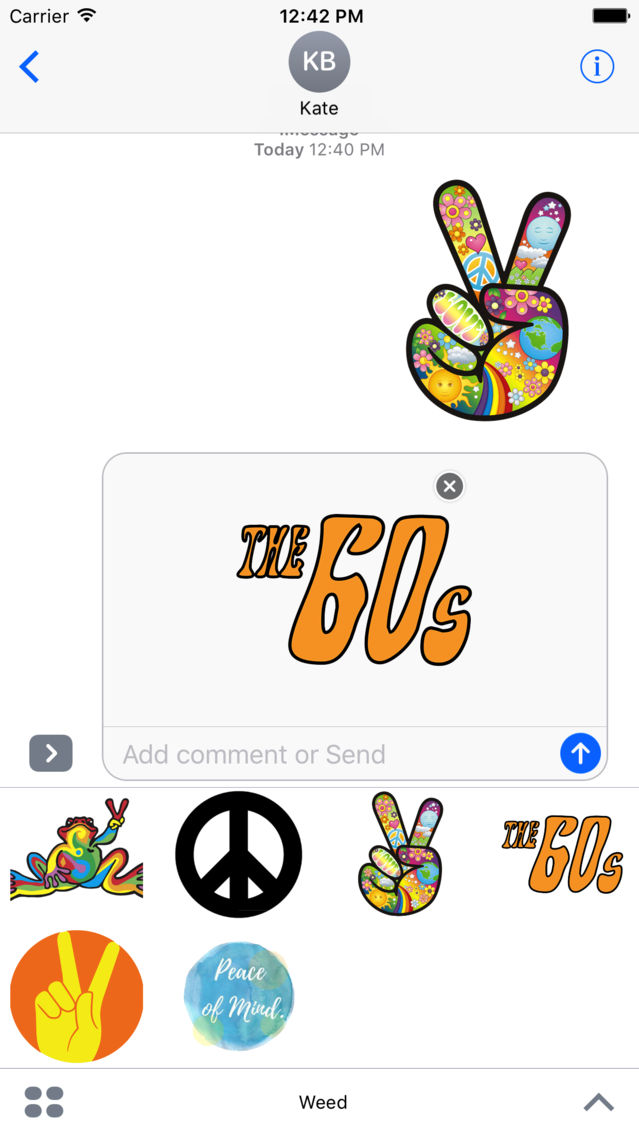
Weed up your text
$0.99
1.0for iPhone, iPad
Age Rating
Weed up your text Screenshots
About Weed up your text
A hippie (or hippy) is a member of a counterculture, originally a youth movement that started in the United States and the United Kingdom during the mid-1960s and spread to other countries around the world. The word hippie came from hipster and was initially used to describe beatniks who had moved into New York City's Greenwich Village and San Francisco's Haight-Ashbury district. The term hippie was first popularized in San Francisco by Herb Caen, who was a journalist for the San Francisco Chronicle.
The origins of the terms hip and hep are uncertain. By the 1940s, both had become part of African American jive slang and meant "sophisticated; currently fashionable; fully up-to-date". The Beats adopted the term hip, and early hippies inherited the language and countercultural values of the Beat Generation. Hippies created their own communities, listened to psychedelic music, embraced the sexual revolution, and many used drugs such as marijuana, LSD, peyote and psilocybin mushrooms to explore altered states of consciousness.
In 1967, the Human Be-In in Golden Gate Park, San Francisco popularized hippie culture, leading to the Summer of Love on the West Coast of the United States, and the 1969 Woodstock Festival on the East Coast. Hippies in Mexico, known as jipitecas, formed La Onda and gathered at Avándaro, while in New Zealand, nomadic housetruckers practiced alternative lifestyles and promoted sustainable energy at Nambassa. In the United Kingdom in 1970, many gathered at the gigantic Isle of Wight Festival with a crowd of around 400,000 people. In later years, mobile "peace convoys" of New Age travelers made summer pilgrimages to free music festivals at Stonehenge and elsewhere. In Australia, hippies gathered at Nimbin for the 1973 Aquarius Festival and the annual Cannabis Law Reform Rally or MardiGrass. "Piedra Roja Festival", a major hippie event in Chile, was held in 1970. Hippie and psychedelic culture even managed to influence 1960s and early 1970s young culture in Iron Curtain countries in Eastern Europe.
Hippie fashion and values had a major effect on culture, influencing popular music, television, film, literature, and the arts. Since the 1960s, many aspects of hippie culture have been assimilated by mainstream society. The religious and cultural diversity espoused by the hippies has gained widespread acceptance, and Eastern philosophy and spiritual concepts have reached a larger audience.
Hippies tended to travel light, and could pick up and go wherever the action was at any time. Whether at a "love-in" on Mount Tamalpais near San Francisco, a demonstration against the Vietnam War in Berkeley, or one of Ken Kesey's "Acid Tests", if the "vibe" wasn't right and a change of scene was desired, hippies were mobile at a moment's notice. Planning was eschewed, as hippies were happy to put a few clothes in a backpack, stick out their thumbs and hitchhike anywhere. Hippies seldom worried whether they had money, hotel reservations or any of the other standard accoutrements of travel. Hippie households welcomed overnight guests on an impromptu basis, and the reciprocal nature of the lifestyle permitted greater freedom of movement. People generally cooperated to meet each other's needs in ways that became less common after the early 1970s.
A derivative of this free-flow style of travel were the hippie trucks and buses, hand-crafted mobile houses built on a truck or bus chassis to facilitate a nomadic lifestyle and free spirit.
The origins of the terms hip and hep are uncertain. By the 1940s, both had become part of African American jive slang and meant "sophisticated; currently fashionable; fully up-to-date". The Beats adopted the term hip, and early hippies inherited the language and countercultural values of the Beat Generation. Hippies created their own communities, listened to psychedelic music, embraced the sexual revolution, and many used drugs such as marijuana, LSD, peyote and psilocybin mushrooms to explore altered states of consciousness.
In 1967, the Human Be-In in Golden Gate Park, San Francisco popularized hippie culture, leading to the Summer of Love on the West Coast of the United States, and the 1969 Woodstock Festival on the East Coast. Hippies in Mexico, known as jipitecas, formed La Onda and gathered at Avándaro, while in New Zealand, nomadic housetruckers practiced alternative lifestyles and promoted sustainable energy at Nambassa. In the United Kingdom in 1970, many gathered at the gigantic Isle of Wight Festival with a crowd of around 400,000 people. In later years, mobile "peace convoys" of New Age travelers made summer pilgrimages to free music festivals at Stonehenge and elsewhere. In Australia, hippies gathered at Nimbin for the 1973 Aquarius Festival and the annual Cannabis Law Reform Rally or MardiGrass. "Piedra Roja Festival", a major hippie event in Chile, was held in 1970. Hippie and psychedelic culture even managed to influence 1960s and early 1970s young culture in Iron Curtain countries in Eastern Europe.
Hippie fashion and values had a major effect on culture, influencing popular music, television, film, literature, and the arts. Since the 1960s, many aspects of hippie culture have been assimilated by mainstream society. The religious and cultural diversity espoused by the hippies has gained widespread acceptance, and Eastern philosophy and spiritual concepts have reached a larger audience.
Hippies tended to travel light, and could pick up and go wherever the action was at any time. Whether at a "love-in" on Mount Tamalpais near San Francisco, a demonstration against the Vietnam War in Berkeley, or one of Ken Kesey's "Acid Tests", if the "vibe" wasn't right and a change of scene was desired, hippies were mobile at a moment's notice. Planning was eschewed, as hippies were happy to put a few clothes in a backpack, stick out their thumbs and hitchhike anywhere. Hippies seldom worried whether they had money, hotel reservations or any of the other standard accoutrements of travel. Hippie households welcomed overnight guests on an impromptu basis, and the reciprocal nature of the lifestyle permitted greater freedom of movement. People generally cooperated to meet each other's needs in ways that became less common after the early 1970s.
A derivative of this free-flow style of travel were the hippie trucks and buses, hand-crafted mobile houses built on a truck or bus chassis to facilitate a nomadic lifestyle and free spirit.
Show More
What's New in the Latest Version 1.0
Last updated on Oct 2, 2017
Version History
1.0
Oct 2, 2017
Weed up your text FAQ
Click here to learn how to download Weed up your text in restricted country or region.
Check the following list to see the minimum requirements of Weed up your text.
iPhone
iPad
Weed up your text supports English



















